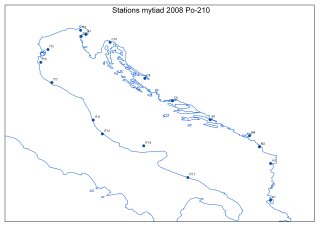 Training Workshop on Polonium-210 - CIESM Mediterranean MusselWatch II Training Workshop on Polonium-210 - CIESM Mediterranean MusselWatch II
27 November 2008, CIESM News
In the framework of the newly launched Phase II of its Mediterranean Mussel Watch Programme (more info), CIESM joined forces with ENEA, and IAEA to organize an international training workshop "Polonium-210 (Lead-210) Survey in the Adriatic Sea - 2008" (La Spezia, ENEA MERC, 11 - 14 November 2008).
The main objective of this initiative was to create a forum where scientists from different countries could share knowledge and expertise, compare techniques, and select harmonized analytical approaches, so as to guarantee that the data produced for MMWII in the Adriatic would be comparable on a spatial and temporal basis and 2) thereby reflect realistically the status/changes of Po-210 levels in Mediterranean coastal waters at the regional scale. |

|

|
Fig. 1. Location of sampling stations.
|
Fig. 2. Digested mussel samples undergoing polonium
(Po-210 + Po-209) plating onto silver discs suspende in the solution.
|
During the workshop, under CIESM guidance scientists from six Mediterranean countries (Albania, Croatia, France, Italy, Montenegro, and Slovenia) selected a common harmonized analytical approach for Po-210 measurements and applied it to the analysis of samples from 18 Adriatic stations (Figure 1). The samples were collected from cages containing live bivalves, which were deployed in May 2008, and then recovered during August of the same year within the regional MYTIAD project, led by the Italian ISPRA and French IFREMER.
The working group analyzed jointly an aliquot of sample per station (i.e., at least two stations per country). Upon return to their home laboratories, participants will then use their own facilities, the harmonized analytical procedure selected, and the common standards provide by CIESM to analyze Po-210 levels. Upon completion of these analyses, the participants will communicate their results to both IAEA and CIESM for intercomparison and standardization purposes and, if needed, seek advice so as to improve their respective analytical procedures.
|

|
|
Fig. 3. Scientists working in the lab.
|

Fig. 4. Group picture.
From the left: Elida Bylyku (CANP, Albania), Sonia Fontani (ISPRA, Italy), Martina Rozmaric Macefat (RBI, Croatia), Marko Strok (JSI, Slovenia), Stefano Salvi (ENEA-BRC, Italy), Fabio Conte (ENEA-ERC, Italy), Alessia Rodriguez y Baena (CIESM, Monaco), Hérvé Thebault (IRSN, France), Roberta Delfanti (ENEA-ERC, Italy), Tomislav Andjelic (CERM, Montenegro).
|
This international initiative will allow drawing the very first distribution map of Po-210 levels in mussels at the scale of the Adriatic sub-region. These results will be presented in January 2009, during a Special Session entitled "Signals of change in the Mediterranean and Black Sea: multi-lateral initiatives", organized by CIESM together with the French INSU and CNRS (Session 64, ASLO 2009, 27 January 2009, Nice, France).
Dr Alessia Rodriguez y Baena, CIESM Scientific Officer (and expert in the radiochemistry of polonium), organized this initiative together with Dr Iolanda Osvath (IAEA-MEL), and Dr Roberta Delfanti (ENEA-MERC). Dr Hérvé Thébault, MMW Coordinator advised the Training Workshop with Alessia on behalf of the Commission. |
|
 |
|



